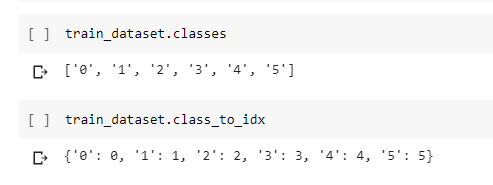The code-
def train_model(n_epoch, data):
Encoder.train()
Decoder.train()
best_acc1 = 0
iter = 0
for epoch in tqdm(range(n_epoch)):
for i, (images, labels) in tqdm(enumerate(data['train'])):
if torch.cuda.is_available():
images = images.cuda().float()
labels = labels.cuda()
else:
images = Variable(images)
labels = Variable(labels)
# print('works')
# Clear gradients w.r.t. parameters
optimizer.zero_grad()
# Forward pass to get output/logits
features = Encoder(images)
features = features.unsqueeze_(1)
outputs = Decoder(features)
# Calculate Loss: softmax --> cross entropy loss
loss = criterion(outputs, labels)
# Getting gradients w.r.t. parameters
loss.backward()
# Updating parameters
optimizer.step()
# print('Optimizer')
iter += 1
if iter % 500 == 0:
# print("iter")
# Calculate Accuracy
accuracy_v = data_accuracy(data, 'valid')
is_best = accuracy_v > best_acc1
best_acc1 = max(accuracy_v, best_acc1)
save_checkpoint({
'epoch': n_epoch,
'iter': iter,
'state_dict_encoder': Encoder.state_dict(),
'state_dict_decoder': Decoder.state_dict(),
'best_acc1': best_acc1,
'optimizer' : optimizer.state_dict(),
}, is_best)
# print("test")
# accuracy_t = data_accuracy(data, 'train')
# Print Loss
print('Iteration: {}. Loss: {}. Accuracy {}'.format(iter, loss.item(), accuracy_v))
Error message -
RuntimeError: CUDA error: device-side assert triggered
Exception raised from launch_vectorized_kernel at /pytorch/aten/src/ATen/native/cuda/CUDALoops.cuh:146 (most recent call first):
frame #0: c10::Error::Error(c10::SourceLocation, std::string) + 0x42 (0x7fd6a31681e2 in /usr/local/lib/python3.6/dist-packages/torch/lib/libc10.so)
frame #1: void at::native::gpu_kernel_impl<__nv_hdl_wrapper_t<false, false, __nv_dl_tag<void (*)(at::TensorIterator&, c10::Scalar), &at::native::add_kernel_cuda, 4u>, float (float, float), float> >(at::TensorIterator&, __nv_hdl_wrapper_t<false, false, __nv_dl_tag<void (*)(at::TensorIterator&, c10::Scalar), &at::native::add_kernel_cuda, 4u>, float (float, float), float> const&) + 0xe03 (0x7fd6a4f37933 in /usr/local/lib/python3.6/dist-packages/torch/lib/libtorch_cuda.so)
frame #2: void at::native::gpu_kernel<__nv_hdl_wrapper_t<false, false, __nv_dl_tag<void (*)(at::TensorIterator&, c10::Scalar), &at::native::add_kernel_cuda, 4u>, float (float, float), float> >(at::TensorIterator&, __nv_hdl_wrapper_t<false, false, __nv_dl_tag<void (*)(at::TensorIterator&, c10::Scalar), &at::native::add_kernel_cuda, 4u>, float (float, float), float> const&) + 0x11b (0x7fd6a4f3934b in /usr/local/lib/python3.6/dist-packages/torch/lib/libtorch_cuda.so)
frame #3: void at::native::gpu_kernel_with_scalars<__nv_hdl_wrapper_t<false, false, __nv_dl_tag<void (*)(at::TensorIterator&, c10::Scalar), &at::native::add_kernel_cuda, 4u>, float (float, float), float> >(at::TensorIterator&, __nv_hdl_wrapper_t<false, false, __nv_dl_tag<void (*)(at::TensorIterator&, c10::Scalar), &at::native::add_kernel_cuda, 4u>, float (float, float), float> const&) + 0xeb (0x7fd6a4f395bb in /usr/local/lib/python3.6/dist-packages/torch/lib/libtorch_cuda.so)
frame #4: <unknown function> + 0x192a486 (0x7fd6a4efb486 in /usr/local/lib/python3.6/dist-packages/torch/lib/libtorch_cuda.so)
frame #5: at::native::add_kernel_cuda(at::TensorIterator&, c10::Scalar) + 0x1a (0x7fd6a4efc1fa in /usr/local/lib/python3.6/dist-packages/torch/lib/libtorch_cuda.so)
frame #6: <unknown function> + 0xbce25e (0x7fd6dad8b25e in /usr/local/lib/python3.6/dist-packages/torch/lib/libtorch_cpu.so)
frame #7: at::native::add_out(at::Tensor&, at::Tensor const&, at::Tensor const&, c10::Scalar) + 0x71 (0x7fd6dad81b61 in /usr/local/lib/python3.6/dist-packages/torch/lib/libtorch_cpu.so)
frame #8: <unknown function> + 0xf3b932 (0x7fd6a450c932 in /usr/local/lib/python3.6/dist-packages/torch/lib/libtorch_cuda.so)
frame #9: <unknown function> + 0x2e9fad8 (0x7fd6dd05cad8 in /usr/local/lib/python3.6/dist-packages/torch/lib/libtorch_cpu.so)
frame #10: <unknown function> + 0x3377258 (0x7fd6dd534258 in /usr/local/lib/python3.6/dist-packages/torch/lib/libtorch_cpu.so)
frame #11: torch::autograd::AccumulateGrad::apply(std::vector<at::Tensor, std::allocator<at::Tensor> >&&) + 0x38a (0x7fd6dd535aaa in /usr/local/lib/python3.6/dist-packages/torch/lib/libtorch_cpu.so)
frame #12: <unknown function> + 0x3375bb7 (0x7fd6dd532bb7 in /usr/local/lib/python3.6/dist-packages/torch/lib/libtorch_cpu.so)
frame #13: torch::autograd::Engine::evaluate_function(std::shared_ptr<torch::autograd::GraphTask>&, torch::autograd::Node*, torch::autograd::InputBuffer&, std::shared_ptr<torch::autograd::ReadyQueue> const&) + 0x1400 (0x7fd6dd52e400 in /usr/local/lib/python3.6/dist-packages/torch/lib/libtorch_cpu.so)
frame #14: torch::autograd::Engine::thread_main(std::shared_ptr<torch::autograd::GraphTask> const&) + 0x451 (0x7fd6dd52efa1 in /usr/local/lib/python3.6/dist-packages/torch/lib/libtorch_cpu.so)
frame #15: torch::autograd::Engine::thread_init(int, std::shared_ptr<torch::autograd::ReadyQueue> const&, bool) + 0x89 (0x7fd6dd527119 in /usr/local/lib/python3.6/dist-packages/torch/lib/libtorch_cpu.so)
frame #16: torch::autograd::python::PythonEngine::thread_init(int, std::shared_ptr<torch::autograd::ReadyQueue> const&, bool) + 0x4a (0x7fd6eacc734a in /usr/local/lib/python3.6/dist-packages/torch/lib/libtorch_python.so)
frame #17: <unknown function> + 0xbd6df (0x7fd7076806df in /usr/lib/x86_64-linux-gnu/libstdc++.so.6)
frame #18: <unknown function> + 0x76db (0x7fd7087626db in /lib/x86_64-linux-gnu/libpthread.so.0)
frame #19: clone + 0x3f (0x7fd708a9ba3f in /lib/x86_64-linux-gnu/libc.so.6)
My code runs fine till like 366 iteration. But after that this error is shown? Any idea what this is? I can’t debug this cause the code seem to run fine untill a certain iteration.
(I am running it in google colab)

